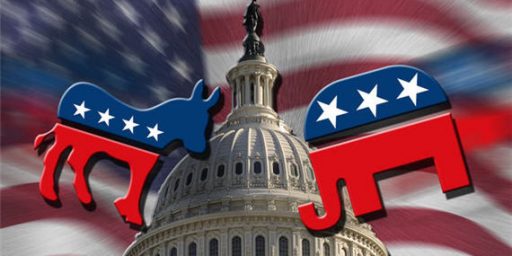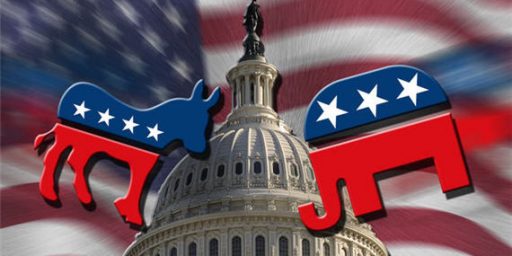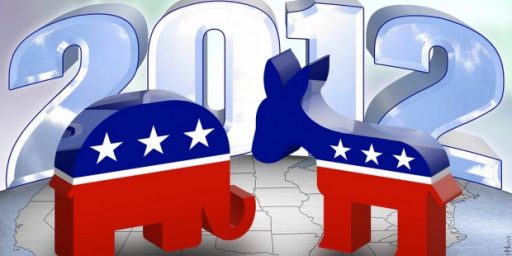D.C. Area Not Feeling Much Pain From Sequester
Among other dire predictions regarding the impact of the sequestration cuts, the run-up to those cuts going into effect included predictions that the Washington D.C. area, where the Federal Government and contractors that do business with it is a large economic force, would feel the impact of those cuts quite harshly. As with other pre-sequestration predictions of doom, that doesn’t seem to be true at all:
In the months since the automatic federal spending cuts known as the sequester took effect, the Washington area has added 40,000 jobs. Income-tax receipts have surged in Virginia, beating expectations. Few government contractors have laid off workers.
It’s too early to be certain, but initial indications are that the damage from the sequester has been modest and slow to develop.
Labor Department statistics released Wednesday showed that the area’s unemployment rate held steady at a seasonally adjusted 5.3 percent in April, the same as in March. The pace of job growth from January to April was only slightly slower this year than last year. Large government contractors are reporting relatively modest revenue hits and few layoffs due to reduced contracts.
Economists caution that the effects could worsen in the months to come, especially once furloughed federal workers drain their savings accounts and contractors adjust to the reality of less government work ahead. Most forecasting models still calculate that sequestration will shave at least half a percentage point off national gross domestic product growth this year.
Still, some forecasters are growing more optimistic that the Washington region, so dependent on federal spending to power economic growth, will endure the cuts better than originally expected.
“The surprise is that the economy is as good as it is,” said Stephen S. Fuller, the economist who directs the Center for Regional Analysis at George Mason University. “We’ve done better than I expected.”
In January, Fuller predicted that the sequester, if enacted, would be an “end-of-the-world kind of hit” to the regional economy. He wrote an analysis of the cuts in March concluding they would kill more than 325,000 jobs in Virginia, the District and Maryland combined.
That estimate included both direct and indirect effects — that is, layoffs not just among federal workers and contractors, but also the workers, such as waiters or car salespeople, whose jobs depend on spending from federal paychecks.
So far, the direct job effects have been relatively small. The metro area shed 1,000 federal jobs in April, accelerating a belt-tightening trend; in the 11 months before that, the area lost nearly 4,000 federal jobs. Meanwhile, professional business services — the job category that includes government contracting — has grown at roughly the same rate this year as in 2012 and 2011. No major contractor has issued a government-required notification that it is planning a mass layoff.
Analysts say it appears that contractors and many federal agencies anticipated the cuts and began trimming spending well in advance of the sequester’s March 1 start date, smoothing the economic impact. Fuller said many agencies have allowed open positions to sit vacant, saving money and reducing the need for layoffs.
“I think the sequestration isn’t going to be quite as bad as a lot of people had feared, at least in terms of direct job losses,” said James Bohnaker, an associate economist at Moody’s Analytics who focuses on the Washington region. “The reason for that is that people were already planning for this last year.”
As with many of the predictions made as the sequester approached, it appears that this one was far more pessimistic than reality is turning out to be. Funny how that happened.





As yet…..
The sequester cuts haven taken full effect yet. I know the Twitter generation expects things to happen instantly, but in the real world these things take time.
“D.C. Area Not Feeling Much Pain From Sequester”
The rest of the country, not so much.
“Thirty-seven percent in the latest ABC News/Washington Post poll say they’ve been negatively impacted by the budget cuts, up from 25 percent in March. As previously, about half of those affected say the harm has been “major.””
The DC area never seems to be much affected by things that affect the rest of the country, one of the reasons the beltway doesn’t understand the rest of the country. Hence, presumably, the name of this blog.
When conservatives rail about big gubmint, I think of the drive from Dulles into DC. Miles and miles of office buildings with the names of contractors and lobbyists. That’s the big gubmint we should be worrying about, not background checks on guns and some IRS weenies screwing up. The people in those DC buildings don’t get laid off, only people back at the factory, or the home office, or whatever.
Anecdotal I concede, but as someone who is retiring at the end of the year, after 24 years of active duty military service, I can tell you that the sequester is unequivocally having a negative impact on my expected quality of life next year.
When I bought my house a couple of years ago, I figured that there was some security (from an employment opportunity perspecitve) to living next to one of the largest military bases in the world.
Turns out I was possibly a bit too optimistic.
Federal Hiring (at least for the DoD) is frozen. It may come back in October, but if the next round of sequester cuts actually takes place, maybe not. There are still contractor jobs out there, but even those are much more tenuous then they’ve been in the past.
What this has meant for me personally is that there are fewer options. Not only does that mean I have to be willing to look at less desireable and/or lower paying jobs, but there’s also more competition for them.
Chances are very good that at this time next year, I’ll be contributing less to the local economy, and paying less taxes, than I might have if goverment spending had been cut in a more rational manner.
… and there’s no way I’m the only one.
p.s. this is not just about “woe, is me”. Enough government worker making a smaller than expected contribution to their local economies will surely also negatively impact the job prospects of non-government employees.
I can tell you that government contractor jobs are harder to get and salaries are getting pushed down. Numerous big name beltway bandit contractors have told their employees to take a 25% pay cut or walk.